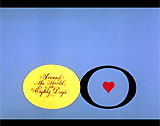
|
Around the World in 80 Days
(1956)
In producer Michael Todd's and British director Michael
Anderson's Best Picture-winning, exciting but tedious and over-long
globe-trotting travelogue - a three-hour epic and adaptation of the
Jules Verne classic 1872 escapist adventure novel, was about a proper,
eccentric Victorian/English gentleman Phileas Fogg who made a financial
wager about circumventing the globe (by every means of transportation
including balloon, train, stagecoach, rickshaw, steamship, elephant,
etc.); it was the largest scale film ever made - created with Todd-AO,
a special wide-screen format. From its eight Oscar nominations, it
won five awards, including Best Picture, Best Adapted Screenplay,
Best Film Editing, Best Cinematography, and Best Music.
The film featured almost
69,000 extras and thousands of animals including sheep, buffalo,
donkeys, horses, monkeys, bulls, elephants, skunks, and ostriches!
The film also used 140 sets built at six Hollywood studios (as well
as on location shoots in England, Hong Kong and Japan). It had a number
of major big-name Hollywood and international stars, including David
Niven as the traveling gentleman Phileas Fogg, Cantinflas (in his American
film debut as valet Passepartout), Shirley MacLaine (as a rescued Indian
princess), and Robert Newton (as an overzealous pursuing detective).
It also featured a globe-trotting ensemble cast in over four-dozen
cameo appearances.
Disney created a big-budget remake - Around the
World in 80 Days (2004):
- in the film's 10-minute introduction-prologue set
in an office-library, broadcast journalist-reporter Edward R. Murrow
(as Himself) narrated as he paid homage to Jules Verne's novel
about futuristic marvels of transportation - in a small 1.37:1
aspect ratio box in the middle of the frame: ("Jules
Verne wrote many books. He was able to transfer his soaring imagination
to print. His predictions were bold. What he wrote was regarded
as fantastic fiction but much of it has become fact. Flying machines,
submarines, television, rockets. But not even his imagination could
shrink the earth to the point it has now reached")
- he also spoke about another shorter Verne book published
in 1865, From the Earth to the Moon, that inspired the first
science fiction film - a short directed by Georges Melies, titled Le
Voyage Dans La Lune (1902, Fr.) - it was shown in part;
the prologue ended with a few more words about Verne's published
book: ("Jules Verne wrote a book about going around the world
in 80 days. He even predicted it could be done in 80 hours. Today
it can be done in less than half that time. But each journey must
have an end. Speed is good only when wisdom leads the way. The
end of this journey - whether to the high horizons of hope or the
depths of destruction - will be determined by the collective wisdom
of the people who live on this shrinking planet. (pointing at a
globe) There was a time not so long ago when learned men thought
that was flat. Around
the World in 80 Days is the Jules Verne classic, and
the world was already shrinking when it was written. And that was
in 1872"); towards the end
of the narration, with the presentation of a guided missile test-launch
in New Mexico, the frame opened up to 2.20:1 Todd-AO wide-screen
- in the film's opening set in the Victorian Era in
England, weathly gentleman Phileas Fogg (David Niven) was introduced
living a modest and solitary life; he was known for being meticulous
and punctual about everything; he fired his valet Foster (John
Gielgud) for bringing him shaving water at the wrong temperature;
he hired a replacement - resourceful Latin-American manservant-butler
Passepartout (Mexican actor Cantinflas), who would immediately
be commissioned to join him for an 'around-the-world' adventure
- as part of the plot, the Bank of England reported
a robbery of £ 55,000 pounds in new bank notes; the heist
was being discussed by the Bank's Governor (President) Mr. Gauthier
Ralph (Robert Morley) and other members of the elite London Reform
Club who were playing the card game of whist together; Fogg observed
to the group: "Only
a cool and logical individual could have engineered such an exploit";
Mr. Ralph also spoke about transportation advances: "A man
can girdle the globe now in three months"; Fogg disagreed: "Less
than that, to be precise. In 80 days"
- according to The Daily Telegraph newspaper, a
new railroad route across India had made a world-circumventing
tour much shorter - and it might be theoretically possible to travel
around the world in 80 days; Fogg bragged: "Nothing is impossible.
When science finally conquers the air, it may be feasible to circle
the globe in 80 hours"; the arrogant-minded
Fogg wagered £ 20,000 pounds with fellow gentlemen of the
Reform Club that he could circumnavigate the globe in 80 days:
("Namely, that I can complete a tour of the world in
80 days. That is to say, 1,920 hours or 115,200 minutes")
- it was agreed that if Fogg left that evening at
8:45 pm on the boat train from London Bridge Station for Dover,
then he would have to return to his starting point at the Reform
Club on Saturday, September 21st at the same time
- the journey began from London via a train bound
for Dover and Calais (Northern France coast) to Paris; the Thomas
Cook travel agent in Paris Monsieur Gasse (Charles Boyer) fancifully
described the various delights along their planned route from France
and onward: ("Now, monsieur, train to Marseilles, steamer to Bombay
via Suez, across India by train, and steamer again to Hong Kong.
Only one drawback. With this route, you miss Bali and the women....In
any case, in Yokohama, you will encounter the geisha girls, and
those, monsieur, are not to be sneezed at...Then, between San Francisco
and New York, you will discover Indian maidens galore, statuesque,
barbaric creatures"); after they learned that
their train's route to Marseilles, France was blocked by an avalanche,
they were forced to travel via a hot-air
balloon that drifted off-course and crossed the Alps to Spain
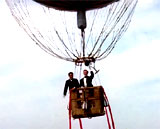
|
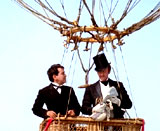
|
|
Hot-Air Balloon From Paris to Spain
|
- various vignettes and misadventures occurred in
various locales during the journey: for example, in Spain, Passepartout
engaged in a bullfight in Chinchón; during the trip, there were
cutaways to a large betting area in London where Fogg's progress and
chances of making it in 80 days kept being revised
- throughout the film, it was
suspected that Fogg has stolen his wagered money from the Bank
of England; Fogg's entourage was pursued by diligent
and suspicious Scotland Yard Inspector Fix (Robert Newton) hired
by Mr. Ralph; he would only be able to serve an
arrest warrant to Fogg on British soil; at first, Fix was sent to
Suez in British-ruled Egypt, to await Fogg's steamer R.M.S. Mongolia to
pass through the Suez Canal on its way to Bombay, India, where he
hoped to apprehend Fogg
- from Spain, the two travelers arranged for a private
yacht to take them to Marseilles, France, and from there they would
proceed to the southern Italian port city of Brindisi in time
to catch the R.M.S. Mongolia steamer
through the Suez and onward to the west coast of India (mostly off-screen)
- after docking in India, the group departed at 4
pm on the Great India Peninsula Railway from Bombay on their way
to Calcutta; in the little village of Kholby, Fogg discovered,
when informed by a Railway Official (Ronald Colman), that about
50 miles of the railway tracks to Allahabad were not completed
as reported; Fogg was forced to hire a elephant for an exorbitant £ 1,000
pounds with a guide (Robert Cabal) to proceed through the dense jungle
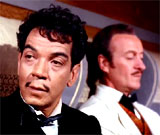
On a Train Traversing India
|
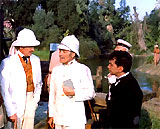
The Unexpected End of the Rail-line Within India
|

Borne on an Elephant Through 50 Miles of Jungle
|
- while the elephant-borne party of travelers was
camped at night, they watched a nearby religious procession of
worshippers of the goddess Kali that was marching to the pagoda
of Pillaji; there in a ritualistic ceremony, young
widowed Princess Aouda (Shirley MacLaine)
had been drugged to force compliance with a human sacrifice (suttee)
by being immolated on her dead husband's funeral pyre; Passepartout
took the place of her late rajah husband on the pyre, resurrected
himself, and rescued her during the ceremony; after
arriving in Allahabad, they continued on to Calcutta (off-screen)
- further progress was made on the S.S. Rangoon steamer
by crossing the Bay of Bengal, passing Thailand, and then traversing
across the South China Sea to Hong Kong (with
streets filled with rickshaws pulled by ostrichs); then, they crossed
the East China Sea on the S.S. Carnatic - passing Shanghai,
China and docking in Yokohama, Japan before setting sail on the
majestic clipper ship - the S.S. General Grant (during intermission) to San
Francisco
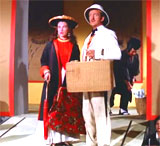
Fogg in Japan with the Princess
|
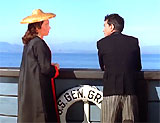
Passepartout with the Princess Onboard the S.S.
General Grant Sailing to San Francisco
|
- in San Francisco's Barbary Coast, they spent a short
evening in a saloon with the owner (Marlene Dietrich), its bouncer
(George Raft), a drunk at the bar (Red Skelton), and its little-seen
pianist (Frank Sinatra); they quickly left the city on a trans-continental
train (with Buster Keaton as a conductor) to traverse
the frontier of the US, traveling through Medicine Bow, Wyoming
Territory; they were faced with an unstable suspension bridge
that collapsed after their locomotive train crossed it at a top
speed of 30 mph
- in Nebraska, they encountered an attack of Sioux
Indians and Passepartout was captured and about to be burned at
the stake when he was saved by a contingent
of cavalry alerted in the Fort Kearney area; however, they missed
their train connection and the train's stationmaster (Joe E.
Brown) wondered why they were in such a rush
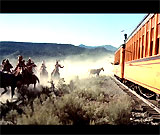
Sioux Indian Attack On the Train
|
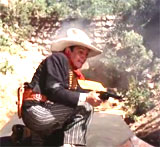
Passepartout Atop Train
|
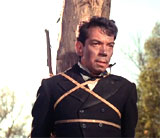
About to Be Burned at the Stake by Sioux
|
- they inventively rigged up
a sail-powered train cart to proceed from Nebraska
to Chicago, where they planned to board a train to NYC, but once
they arrived in the city, they were too late for their scheduled
eastbound Cunard steamship China; the group was forced
to commandeer a coal-burning trading steamship - the
S.S. Henrietta bound for Caracas, Venezuela;
they redirected it to Liverpool, England; along
the way when fuel ran low after proceeding at full-steam, Fogg bought
the ship for £ 5,000 pounds, and then ordered most of the
entire wooden ship to be disassembled
to burn it for fuel: ("Pile everything that will burn into the
stoke hole"); fortunately, land was sighted shortly later
- a six-hour London Express train ride from Liverpool,
England was expected to bring the group to Paddington Station in
London at 6:02 pm, with more than enough time to get to the
Reform Club; however, at the Liverpool Station, Fogg
was arrested by Fix and charged with robbing £ 55,000 pounds
from the Bank of England on July 3rd; hours later, he was released
when the "real culprit" was arrested in Brighton, but then,
once the journeying group arrived at Fogg's
home in London, they thought that they had lost the wager; the mood
was one of melancholy and depression
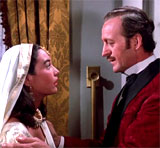
Princess Aouda's Proposal of Marriage to Fogg
|
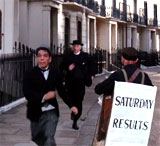
Passepartout: "It's Saturday!"
|
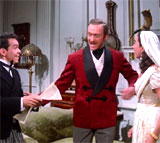
Fogg: "Great heavens! We've crossed the International
Date Line. We've gained an entire day"
|
- to make Fogg feel better and to offer to share in
his grief, Princess Aouda proposed to be his wife: "In my country,
Mr. Fogg, it is said that misfortune if shared with another sympathetic
spirit, can be borne with resignation. Mr. Fogg, do you wish
at once a kinswoman and a friend?...Will you have me for your wife?"
- Passepartout was immediately sent out to make
marital arrangements with Reverend Samuel Wilson (Frank Royde) of
Marylebone Parish for the next day; while racing back on foot to
Fogg's home with the Reverend, a poster-board of a newspaper seller
read: "SATURDAY'S RESULTS"; Passpartout was shocked and reported
back to Fogg; both realized that they had crossed
the International Date Line - and since they had traveled East,
they had saved one day, and were still within the 80 days period:
(Fogg: "We went eastward around the world, always moving towards
the sun. Great heavens! We've crossed the International Date Line.
We've gained an entire day. This is it. This is the 80th day. It's Saturday")
- with only about 11 minutes to spare,
they rushed to the Reform Club to win the wager; Fogg punctually
entered the room at 8:45 pm with a simple: "Well, gentlemen,
here I am. I trust that I've not kept you waiting"
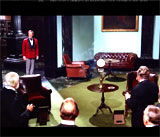
|
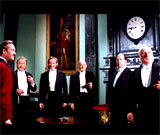
|
|
Fogg's Punctual Arrival at the Reform Club
- "Well, gentlemen, here I am"
|
- the group
of gentlemen, including Fogg, were more upset that a woman (the
Princess) entered their exclusive mens-only club room behind Fogg
than anything else: "Great
Caesar's ghost! A woman in the club!"; Fogg approached the
Princess and asked her to leave: "My dear, I must ask you
to leave these precincts at once! No woman has ever set foot in
the club...Because that could spell the end of the British Empire";
Mr. Ralph uttered the final double-entendre line: "This is the
end!"
- the film's 7-minute animated closing credits were
inventively created by Saul Bass, to briefly summarize the film's
plot with caricatures and artwork for each star
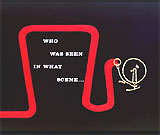
|
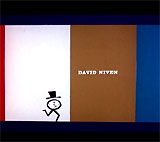
|
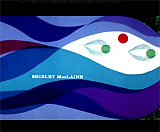
|
|
Saul Bass' Animated Closing Credits Sequence
|
|
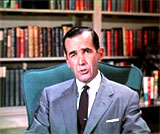
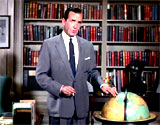
Edward R. Murrow (Himself) in Prologue
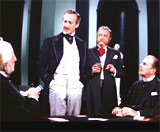
Phileas Fogg (David Niven) Wagering £ 20,000 Pounds To Go Around
the World in 80 Days
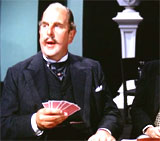
The Bank of England's Governor (or President) Mr. Ralph (Robert Morley)
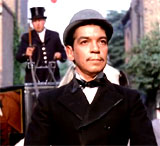
Fogg's Valet - Passepartout (Mexican Actor Cantinflas)
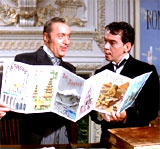
Travel Agent Monsieur Gasse (Charles Boyer) at Thomas Cook's in Paris
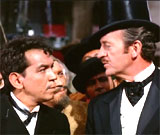
On Their Travels - Passepartout with Fogg in Spain
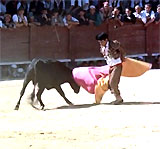
Passepartout Bullfighting in Spain
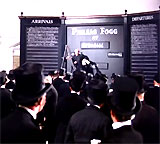
In London, Betting on Fogg's Chances of Making It in 80 Days
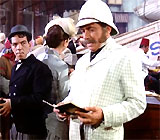
Scotland Yard Inspector Fix (Robert Newton)
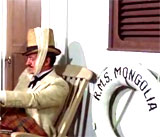
Fogg on the R.M.S. Mongolia On Its Way to India
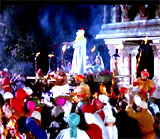
Passepartout Rising Up on a Funeral Pyre
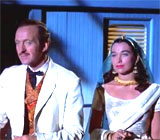
Fogg With the Rescued Princess
Aouda (Shirley MacLaine) on the Deck of the S.S. Rangoon
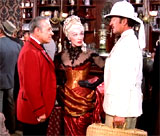
During a Short Visit to a Barbary Coast Saloon, with Owner (Marlene Dietrich) and Bouncer
(George Raft)
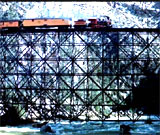
Train Crossing Unstable Bridge Before Its Total Collapse
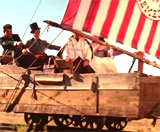
Train Cart With Sail in the Midwest
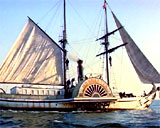
The S.S. Henrietta Hijacked to Liverpool, England
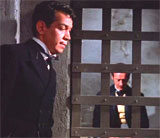
In Liverpool, Fogg Was Unjustly Arrested for Bank Robbery
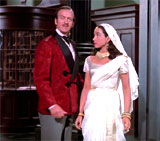
Fogg Asking the Princess to Leave the Exclusive Reform Club
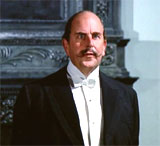
Mr. Ralph: "This is the end!"
|





















